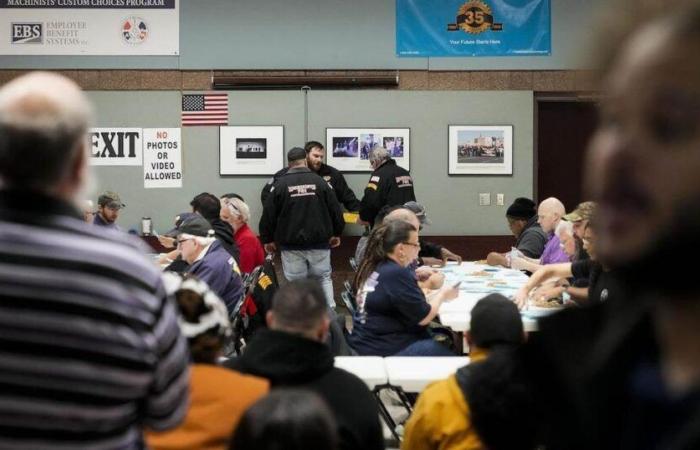The approximately 33,000 striking Boeing workers in the Seattle region will be able to return to work. After more than seven weeks of strike which cost the company and its suppliers more than ten billion dollars, employees accepted a new draft social agreement.
After rejecting two offers, IAM-District 751, branch of the machinists’ union (IAM), indicated Monday evening that it had approved by 59% the agreement providing for a salary increase very close to its demands, but not the restoration of the old retirement system.
>> To find out more about the strike, read: Boeing once again raises its offer to end its workers’ strike
“The strike is going to end and it is now up to us to get back to work and start building the planes, raise prices and get this company back on the path to financial success,” said Jon Holden, president of IAM-District 751, during a press conference.
The group’s boss since August, Kelly Ortberg, said he was “happy” that an agreement had been reached. “The past months have been difficult for all of us, but we are on the same team,” he said in a message to employees.
Salaries, pensions, job retention
The project announced Thursday evening includes a salary increase of 38% over the four years of the social agreement, while the union demanded 40%.
Many employees also hoped for the reestablishment of the guaranteed amount retirement pension system, abolished by a social agreement in 2014 in favor of a funded system. But for Boeing, this backpedaling is inconceivable because it is “excessively expensive”.
The group also reinstated an annual bonus (4% of annual salary), increased the ratification bonus (from 3,000 to 12,000 dollars) and increased the contribution to the capitalization retirement plan.
It has maintained its commitment to manufacturing its next plane, expected by 2035, in the Seattle region, birthplace of Boeing, which represents a guarantee of tens of thousands of jobs for several decades.
The most expensive strike of the century
This is Boeing’s fourth offer since the beginning of September, but the third submitted to a vote by members. The other two offers were rejected.
President Joe Biden “congratulated” the union and the firm “for reaching an agreement that reflects the hard work and sacrifices of the 33,000 machinists” and also mentioned the support of his economic team.
According to the Anderson Economic Group, this is the costliest strike of this century in the United States with more than 11.56 billion dollars (approximately 9.10 billion francs) of direct impact since the 13 September, including 6.50 billion in shortfall for Boeing and 2.87 billion for its suppliers. With the assembly of the Boeing 737 Max and 777 having been practically stopped, it was crucial for the aircraft manufacturer, in great financial difficulty, that the strike ended.
>> Review the 7:30 p.m. topic on Boeing’s losses:
Subject covered in La Matinale of November 5
agencies/juma






